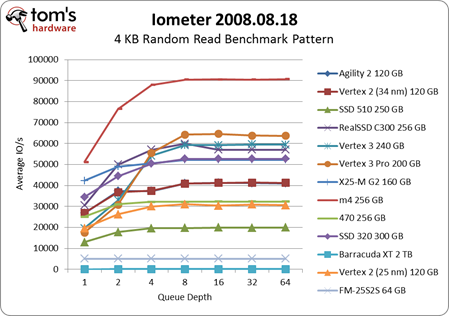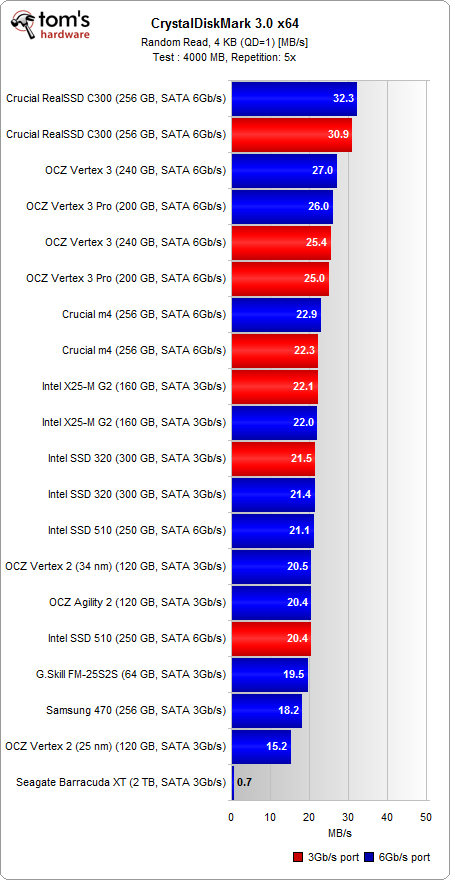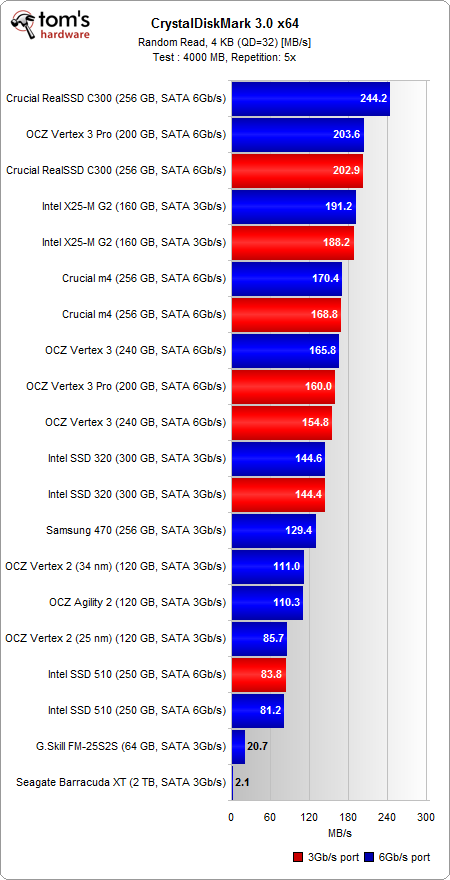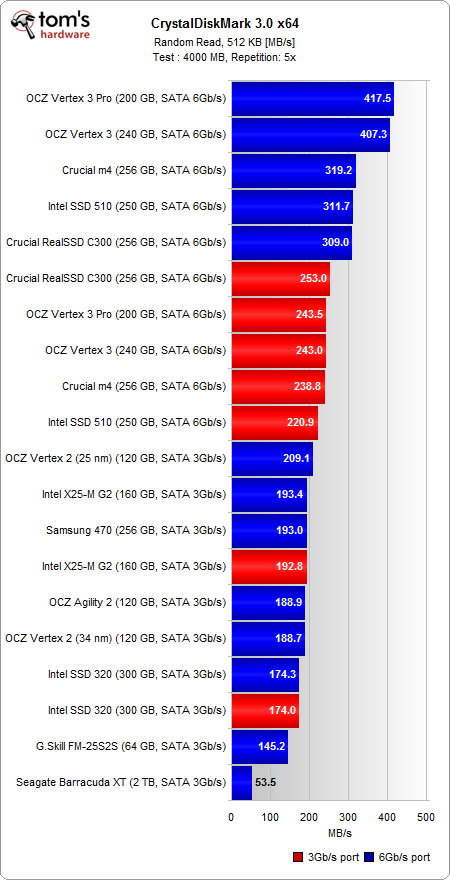Crucial m4 And Intel SSD 320: The Other SSD Competitors
Get Tom's Hardware's best news and in-depth reviews, straight to your inbox.
You are now subscribed
Your newsletter sign-up was successful
Benchmark Results: 4 KB And 512 KB Random Reads
This benchmark may seem completely at odds with our earlier Iometer results (especially Crucial's m4), but it's important to understand how Iometer calculates IOPS. Most manufacturers list a mixture of burst and sustained performance, because neither is a good indication of performance on its own. Our benchmark runs for a short duration, which is why our results give more weight to burst performance. We also run Iometer with four threads, and the program totals the IOPS at every queue depth. Normally, the total IOPS at every queue depth is a good approximation of how close actual performance is to what we see listed on the spec sheet. But the m4 scores abnormally high because the IOPS performance of each thread is nearly identical at each queue depth. Usually, each thread's performance differs because they are all competing for a share of total throughput. This is similar to what occurs when multi-threaded applications simultaneously demand CPU resources. As a result, the score we get from Crucial's m4 seems to be in error. We are working with Crucial to find an explanation, and we'll update this section accordingly when we get one.
Intel's SSD 320 shows much more consistent throughput. At higher queue depths, it matches the 50 000 IOPS performance we see with the X25-M. At queue depths lower than four, we see the SSD 320 falls short of its predecessor.
Because CDM gives more weight to sustained performance, we get to see a different aspect of how a drive performs. Bumping queue depth all the way to 32 helps push the Crucial m4 above the Vertex 3s. However, the m4 still falls almost 50% behind the older C300. This is a situation where Crucial's C300 really shines. In comparison, the SSD 320 come close to the X25-M at lower queue depths, but at higher queue depths, the SSD 320 falls short by about 20%.
Larger files give Crucial's m4 room to benefit from its 6 Gb/s interface, and we see the Crucial's newest drive pull slightly ahead of Intel's SSD 510.
Meanwhile, the SSD 320 nearly falls to the bottom of the list. It only outperforms the older JMicron-based G.Skill SSD and Seagate's Barracuda XT.
Get Tom's Hardware's best news and in-depth reviews, straight to your inbox.
Current page: Benchmark Results: 4 KB And 512 KB Random Reads
Prev Page Benchmark Results: CrystalDiskMark Streaming Performance Next Page Benchmark Results: 4 KB And 512 KB Random Writes-
Could you expand on the Full Disk Encryption capabilities of the Intel 320?Reply
If you can actually use hardware FDE on that drive (rather than just secure erase), that's a winner for me. -
bto Why does the Intel 510 250GB appear to have two scores in crystalmark? (469.4 and 259.7) on the top benchmark on page: "Benchmark Results: CrystalDiskMark Streaming Performance" the specs are identical for both.Reply -
poppasmurf Great lil tidbit, wonder what the difference will be between other SSD's with different interface connections other than physical appearance and the interface connection. More on the lines of pro's and con's between the SSD interface connections I'm referring to the OCZ PCI-e drives vs. SATA 6GB just a thought to stir up the hoop la of ssd's :PReply -
JohnnyLucky I am beginning to wonder if we haven't reached the point where the human eye and brain are finding it harder to differentiate performance among ssd's. Some mainstream benchmarks seem to suggest that. Some of the benchmarks in this review seem to indicate the same. There are some very tight groupings.Reply -
henryvalz At the speed points that SSDs are functioning, I'm beginning to think that durability and reliability might be the best basis for decision. I would also really like to see some boot times from Windows 7, or loading time for games.Reply -
kev_stev Does anyone know when the vertex 3 and M4 are going to actually be available? I have heard rumors that the vertex 3 will be released "any day now" since mid march...Reply -
iamtheking123 I'll go SSD in my next build, probably in a year and a half. Right now I'm satisfied with Raid 0-ed 1TB Caviar Blacks.Reply



